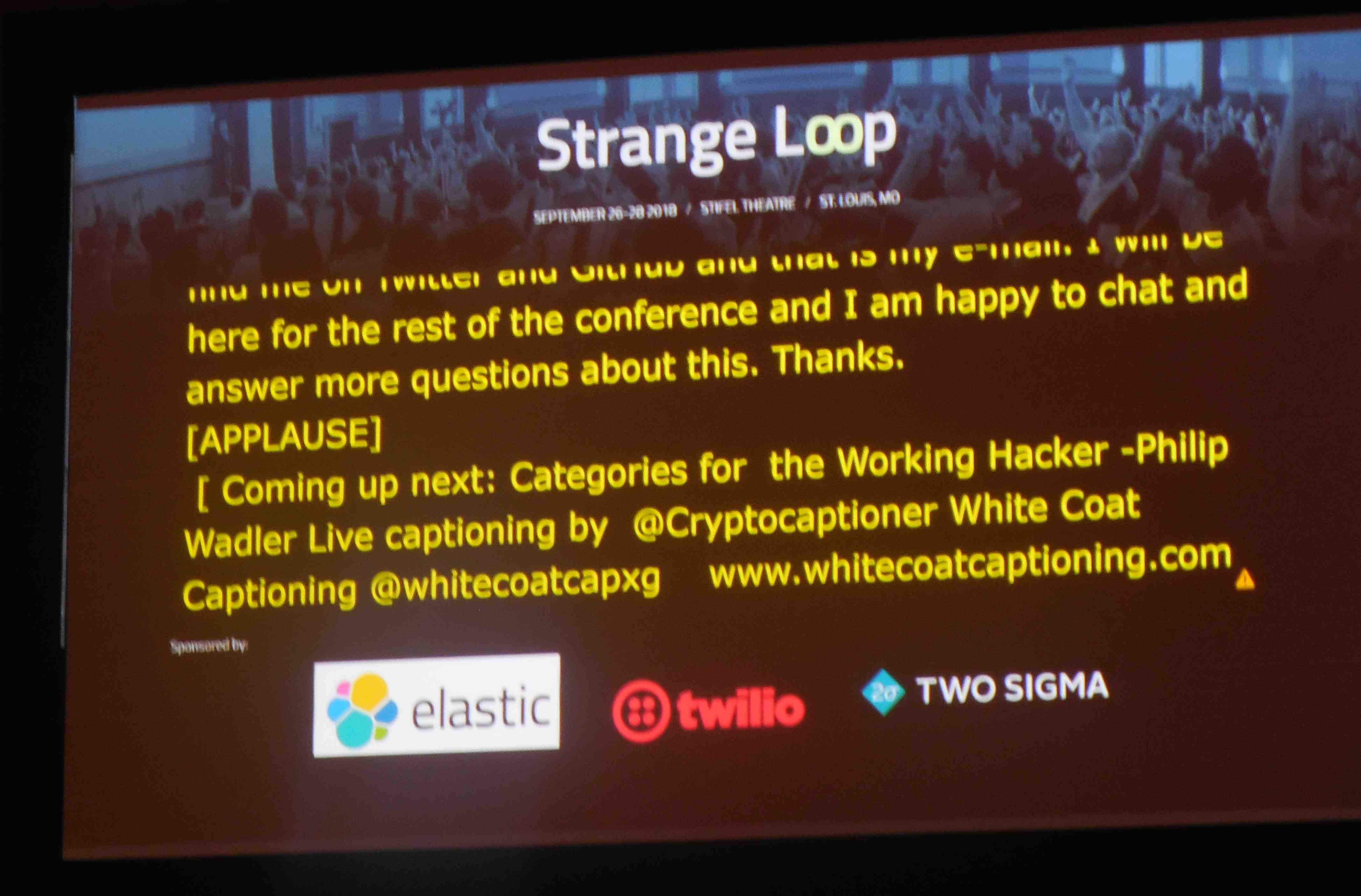TITLE: Strange Loop 5: Day Two
AUTHOR: Eugene Wallingford
DATE: October 02, 2018 4:04 PM
DESC:
-----
BODY:
Friday was a long day, but a good one. The talks I saw were
a bit more diverse than on
Day One:
a couple on language design (though even one of those covered
a lot more ground than that), one on AI, one on organizations
and work-life, and one on theory:
•
"All the Languages Together", by
Amal Ahmed,
discussed a problem that occurs in multi-language systems:
when code written in one language invalidates the guarantees
made by code written in the other. Most languages are not
designed with this sort of interoperability baked in, and
their FFI escape hatches make anything possible within
foreign code. As a potential solution, Ahmed offered
principled escape hatches designed with specific language
features in mind. The proposed technique seems like it
could be a lot of work, but the research is in its early
stages, so we will learn more as she and her students
implement the idea.
This talk is yet another example of how so many of our
challenges in software engineering are a result of
programming language design. It's good to see more language
designers taking issues like these seriously, but we have a
long way to go.
•
I really liked
Ashley Williams's
talk on on the evolution of async in Javascript
and Rust. This kind of talk is right up my alley... Williams
invoked philosophy, morality, and cognitive science as she
reviewed how two different language communities incorporated
asynchronous primitives into their languages. Programming
languages are designed, to be sure, but they are also the
result of "contingent turns of history" (a lá Foucault).
Even though this turned out to be more of a talk about the Rust
community than I had expected, I enjoyed every minute. Besides,
how can you not like a speaker who says, "Yes, sometimes I'll
dress up as a crab to teach."?
(My students should not expect a change in my wardrobe any
time soon...)
•
I also enjoyed "For AI, by AI", by
Connor Walsh.
The talk's subtitle, "Freedom & Evolution of the
Algopoetic Avant-Garde", was a bit disorienting, as was its
cold open, but the off-kilter structure of the talk was easy
enough to discern once Walsh got going: first, a historical
review of humans making computers write poetry,
followed by a look at something I didn't know existed... a
community of algorithmic poets — programs — that
write, review, and curate poetry without human intervention.
It's a new thing, of Walsh's creation, that looks pretty cool
to someone who became drunk on the promise of AI many years
ago.
I saw two other talks the second day:
- the after-lunch address by Philip Wadler, "Categories for
the Working Hacker", which I wrote about
separately
- Rachel Krol's
Some Things May Never Get Fixed,
about how organizations work and how developers can thrive
despite how they work
I wish I had more to say about the last talk but, with
commitments at home, the long drive beckoned. So, I departed
early, sadly, hopped in my car, headed west, and joined the
mass exodus that is St. Louis traffic on a Friday afternoon.
After getting past the main crush, I was able to relax a bit
with the rest of Zen and the Art of Motorcycle Maintenance.
Even a short day at Strange Loop is a big win. This was the
tenth Strange Loop, and I think I've been to five, or at least
that's what my blog seems to tell me. It is awesome to have a
conference like this in Middle America. We who live here
benefit from the opportunities it affords us, and maybe folks
in the rest of the world get a chance to see that not all
great computing ideas and technology happen on the coasts of
the US.
When is Strange Loop 2019?
-----

